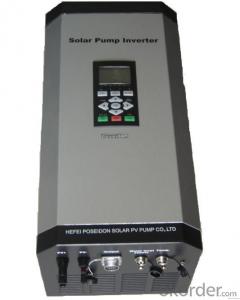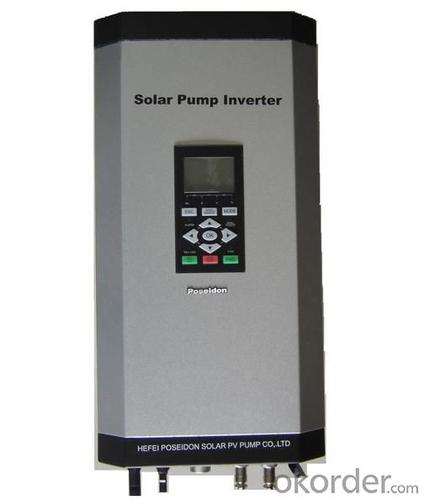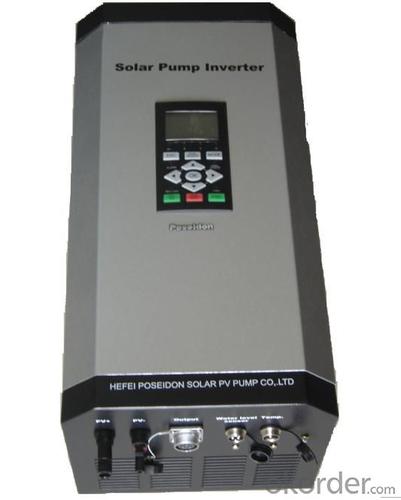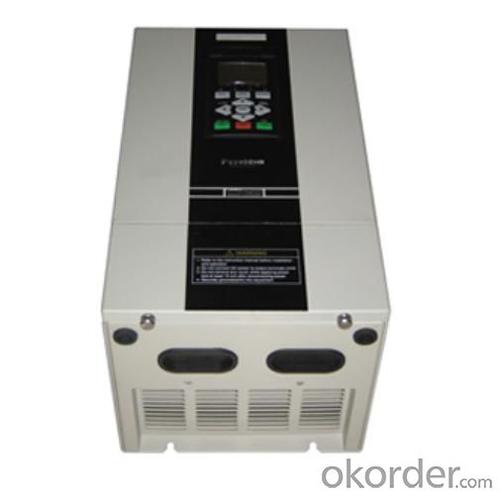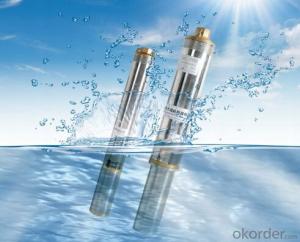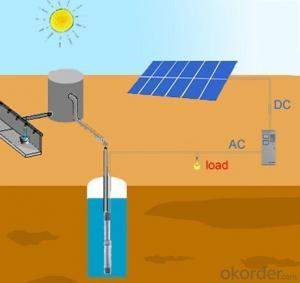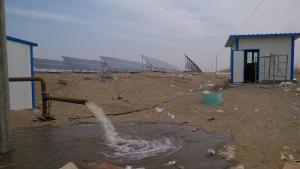RPS 800 Solar Pump FCPM4KWH Inverter
- Loading Port:
- China Main Port
- Payment Terms:
- TT OR LC
- Min Order Qty:
- -
- Supply Capability:
- -
OKorder Service Pledge
Quality Product, Order Online Tracking, Timely Delivery
OKorder Financial Service
Credit Rating, Credit Services, Credit Purchasing
You Might Also Like
Solar pump inverter FCPM4KWH Product Description:
Product Description:
Solar water pumping system is constructed with solar panel array,solar pump inverter and AC water pump, DC current produced from solar panel will be delivered to solar pump inverter,and it will convert it into AC current to drive water pump,and will automatically regulate output frequency according to sun radiance intensity,maximally realize MPPT tracking function.
Product Features
Adopting the proposed dynamic VI maximum power point tracking (MPPT) control method, with fast response, and reliable operation, achieves efficiency of 99%.
Designed with variable frequency driver, greatly improves efficiency
Extremely high efficiency
Digital mode control, with automatic operation and manual operation mode options
Complete protection functions
Adopts intelligent IPM module, with high reliability
LCD display and operation panel, in real time presents operating data
Optional for water level measurement and control circuit
Applicable for general ACC pumps, like centrifugal pump, piston pump etc.
Independent intellectual property; Highly effective, the redundant reliability, exempts the maintenance and the long life.
The pumps are soft started, fully protected.
No batteries are used. So better Sunlight, more water
Datasheet.
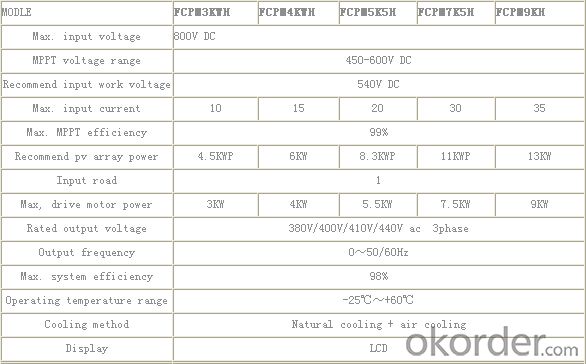
- Q: How does a solar pump handle fluctuations in water demand?
- A solar pump handles fluctuations in water demand by adjusting its output based on the available sunlight and the system's design. When there is ample sunlight, the solar panels generate more power, allowing the pump to work at its maximum capacity. During periods of low sunlight or increased water demand, the pump may not be able to meet the full demand, but it will still operate at a reduced capacity to deliver water as efficiently as possible.
- Q: How does a solar pump help in reducing the use of chemical pesticides?
- A solar pump helps in reducing the use of chemical pesticides by providing a sustainable and eco-friendly alternative for irrigation. By utilizing solar energy, the pump powers the irrigation system, ensuring a consistent and reliable water supply for crops. This helps in maintaining optimal soil moisture levels, reducing the risk of pests and diseases. Additionally, solar pumps can be combined with drip irrigation systems, which deliver water directly to the plant's root zone, minimizing water wastage and preventing the spread of pests and diseases that often thrive in moist conditions. The reduced reliance on chemical pesticides not only promotes healthier and more sustainable farming practices but also contributes to a cleaner environment.
- Q: How does a solar pump help in reducing electricity bills?
- A solar pump reduces electricity bills by utilizing the energy from the sun to power the pump, eliminating the need for grid electricity. This renewable energy source is free and abundant, allowing users to save on their electricity costs.
- Q: How does a solar pump handle water quality monitoring?
- A solar pump typically does not handle water quality monitoring directly. However, additional devices or sensors can be integrated into the system to monitor water quality parameters such as pH levels, turbidity, chemical concentrations, or bacterial presence. These devices can be connected to the solar pump system and provide real-time data on water quality, allowing users to monitor and maintain the desired water quality standards.
- Q: What are the advantages of using a solar pump?
- There are several advantages of using a solar pump. First and foremost, solar pumps are powered by the sun, which means they are cost-effective as they do not require electricity from the grid. This helps to reduce energy expenses and lower overall operating costs. Additionally, solar pumps are environmentally friendly, as they produce no greenhouse gas emissions or pollution during operation. They also provide a reliable and consistent water supply, especially in areas with limited access to electricity. Moreover, solar pumps are low maintenance, with fewer moving parts compared to traditional pumps, resulting in reduced repair and replacement costs. Overall, using a solar pump offers economic, environmental, and practical benefits in terms of energy efficiency and sustainable water management.
- Q: Are solar pumps suitable for residential use?
- Yes, solar pumps are suitable for residential use. They provide a cost-effective and environmentally-friendly solution for various residential needs, such as water supply for gardens, fountains, swimming pools, or even domestic use. Solar pumps are easy to install, operate, and maintain, making them a great choice for homeowners seeking sustainable alternatives to traditional electric pumps.
- Q: Can a solar pump be used for water supply in a remote research facility?
- Yes, a solar pump can be used for water supply in a remote research facility. Solar pumps are an efficient and sustainable solution for remote locations where access to electricity may be limited. They can effectively draw water from a well or any other water source and supply it to the facility, providing a reliable and environmentally friendly water supply.
- Q: Do solar pumps require a lot of space for installation?
- No, solar pumps do not require a lot of space for installation. They are compact and can be easily installed in small spaces, making them suitable for various applications including agriculture, residential, and commercial use.
- Q: Are there any limitations on the water pressure that a solar pump can provide?
- Yes, there are limitations on the water pressure that a solar pump can provide. The water pressure generated by a solar pump depends on various factors such as the capacity and efficiency of the pump, the intensity of sunlight, the size of the solar panel, and the height or distance the water needs to be pumped. Therefore, the water pressure provided by a solar pump may not be as high as that of traditional electric pumps or may vary depending on these factors.
- Q: What is the average cost of a solar pump?
- The average cost of a solar pump typically ranges from $1,500 to $5,000, depending on factors such as the pump's capacity, quality, and additional features.
Send your message to us
RPS 800 Solar Pump FCPM4KWH Inverter
- Loading Port:
- China Main Port
- Payment Terms:
- TT OR LC
- Min Order Qty:
- -
- Supply Capability:
- -
OKorder Service Pledge
Quality Product, Order Online Tracking, Timely Delivery
OKorder Financial Service
Credit Rating, Credit Services, Credit Purchasing
Similar products
Hot products
Hot Searches
Related keywords

